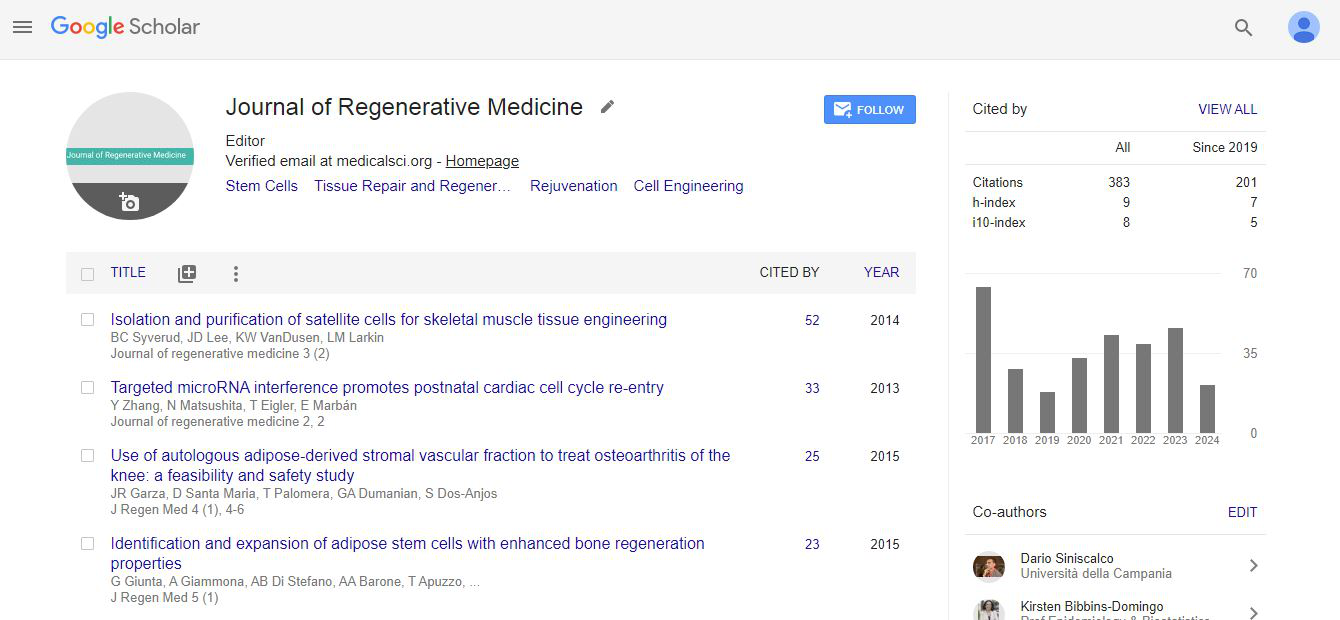The use of mesenchymal and progenator stem cells for wound care
Nicole LaForest
Academy of Veterinary Technicians in Regenerative Medicine, USA
: J Regen Med
Abstract
The use of mesenchymal and progenator stem cells for wound care and stimulation have been proven to accelerate wound healing through the secreted growth factors obtained within the cells. Bone Marrow (BM-MSC’s) and Adipose-derived (ADSC’s) have been shown to accelerate dermal fibroblasts secreted growth hormones. BM-MSC’s are conditioned to release proteins like IGF-1, keratinocyte growth and stromal derived factors (-1), as well as EGF, angiopoietin-1, alpha and beta proteins and more. Both BM-MSC’s and ADSC’s are being used to created concentrated mediums and scaffolding to advance wound healing. Clinical evidence has been shown to report the use of ADSC’s to be a substantial substitute in the absence of BM-MSC’s. Complexity of the wound will disrupt the synergistic response that this therapy elicits from the injury. But, research and clinical based evidence surrounding progenitor allogenic, autologous and xenogeneic regenerative therapies have showed promising research in healing chronic injuries and adhesion formations. In current medical practice, it is recommended that gene delivery be administered through liposomal vectors and high-pressure administration. BM-MSC’s and ADSC’s have been proven to be beneficial through the use of allogenic donor stem cells via intradermal administration into full-thickness cutaneous wounds and accompanying localized inflammation. By administering MSC’s to treat wounds; collagen synthesis, angiogenesis and cellular proliferation occur more rapidly than with a wound attended to without the use of regenerative medicine. Platelet rich plasma (PRP) has also be utilized heavily in wound healing management. Popularity of PRP in small animal medicine has been gaining grounds in the past decade due to the platelets ability to replicate the normal morphology of the surrounding tissues with similar characteristics. The mechanisms of which BM-MSC’s, ADSC’s and PRP are still wildly unknown when we consider the imbalance that’s produced when the sample cells are missing or depleted of certain chemokines and cytokines.
Biography
Nicole LaForest is a registered and licensed veterinary technician serving as the current president of the Washington State Association of Veterinary Technicians. She spends a majority of her time managing Mayo Veterinary Services, the largest specialty, ambulatory practice in the US; based out of the Seattle Area and primarily specializing in orthopedics and regenerative medicine therapies. Nicole currently holds degrees in Human Healthcare Management, Psychology and Veterinary Medicine. She is also the founding member and president of the Academy of Veterinary Technicians in Regenerative Medicine (AVTRM), an organization committed to making Regenerative Medicine a specialty in veterinary medicine
E-mail: nicolethevettech@yahoo.com
 Spanish
Spanish  Chinese
Chinese  Russian
Russian  German
German  French
French  Japanese
Japanese  Portuguese
Portuguese  Hindi
Hindi 